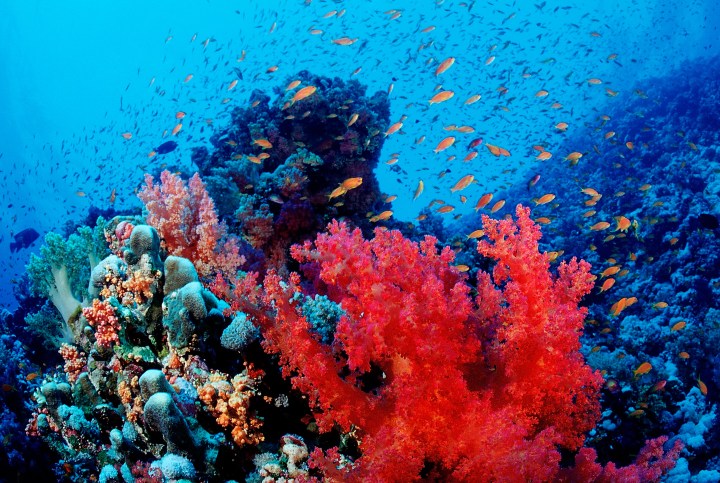ISS TODAY OP-ED
Poor control over plunder of Algeria’s ‘red gold’ sees precious organism facing extinction

Will allowing red coral harvesting protect this precious species or add to its risk of extinction?
Red coral, found along the Mediterranean coastline, faces extinction due to modern harvesting methods, theft, habitat destruction and climate change. Algeria has the largest reserve of this ‘red gold’ in the Mediterranean, and the country is a prime commercial harvester of the colourful organism, which can fetch up to €5,000 per kg.
Ranging in colour from pale pink to deep red, this precious commodity was used as jewellery by the ancient Egyptians, Greeks and Romans. Traces have been found at archaeological sites across Europe, adorning art, sculptures and ornaments.
Red coral plays an important role in the Mediterranean ecosystem. After France’s conquest of Algeria in 1830, the coral trade played a vital role in the settlement of Europeans and the country’s economic growth. Today red coral is also used to make aeroplane and rocket screws resistant to high atmospheric pressures.
A moratorium on harvesting was in place from 2001 to 2021 to prevent the coral’s disappearance from the country’s coastline. Prices surged due to the ban, incentivising illegal harvesting and smuggling of red coral, says Reda Djenane, president of Algeria’s National Commission of Fishing and Aquaculture.
Since 2000, coastal security services have seized over 15 tonnes of illegally harvested red coral. In 2019, Tunisian police arrested seven Tunisians, two Spaniards and an Algerian trying to smuggle nearly 700 kg of red coral worth almost €2-million from Algeria to Tunisia. Around three tonnes are trafficked annually from Algeria to be sold in Torre del Greco near Naples in Italy — the global centre of red coral processing.
Around 80% of Algeria’s fished red coral is illegally exported to Europe, depriving the government of revenue from legal exports. A scientist who requested anonymity told the Enact project that illegal harvesting in Algerian waters also disadvantaged other countries and islands, such as Corsica, where red coral fishing is regulated.
Since the moratorium on red coral harvesting was lifted in 2021, its collecting and selling have been regulated. Licensed fishers must sell 70% of their product to the state company AGENOR. No more than 3 000 kg may be harvested annually in selected areas.
Fishing locations and annual haulage are also controlled, with exploitation allowed for five years, after which the waters must lie fallow for at least 20 years to allow the coral to regenerate. Red coral grows only 0.5 mm a year, the scientist says, and colonies can take a century to develop into beautiful branching structures.
By legalising red coral fishing, Algeria hopes to control illicit harvesting and its harmful consequences. But critics argue that fishers might not declare their entire harvest, and sell the excess on the black market at inflated prices. They also fear that poaching will be replaced by state-approved looting.
Visit Daily Maverick’s home page for more news, analysis and investigations
Conserving red coral requires a global effort that considers its growing industrial and commercial value and its role in supporting Mediterranean marine ecosystems.
In 1987, Spain unsuccessfully tried to list red coral under the Convention on International Trade in Endangered Species of Wild Fauna and Flora (Cites), which would enable control of the international trade. Twenty years later, the United States and European Union also failed. And so individual countries have made their own national decisions about protecting and trading in red coral.
Spain placed a two-year moratorium on exploiting the coral in 2020, and in France, fishers are registered and must hold a certificate for those working underwater. There is an annual limit on the number of fishing licences granted, and fishers record all their harvests.
A new law in Italy stipulates where and when fishing is allowed, daily extraction limits, and ports where red coral may be offloaded. Algeria could learn from Italy’s approach. According to Alessandro Cau, an Assistant Professor of Marine Ecology at the University of Cagliari, data confirms that coral fishing in Italy is sustainable, with coral reefs regenerating along its Mediterranean coastline.
To strengthen its laws, Algeria could draw on the United Nations Food and Agriculture Organization recommendations that prohibit red coral harvesting in waters less than 50 m deep. Cau says it’s also important to limit the number of licences granted.
But red coral smuggling isn’t just a national concern — it is a transnational criminal activity. That means international coordination, enforcement and funding are required to curb the illegal trade from source to sale.
Making illegally harvested red coral difficult to sell is critical. Since smuggled coral is sold as raw material, traceability mechanisms are essential along the entire harvesting and production chain. This is vital, particularly in countries where unequal markets pit those who regulate and limit their red coral fishing against those where poaching is rife.
Algeria’s regulations must be amended to require a certificate guaranteeing that the coral is fished according to national or regional (Mediterranean) legislation. This is essential for sustainable harvesting and building a unified red coral management plan across the Mediterranean. DM
Abdelkader Abderrahmane, Senior Researcher, West Africa Regional Organised Crime Observatory, Enact project, Institiute for Security Studies (ISS).
Enact is funded by the European Union and implemented by the Institute for Security Studies in partnership with Interpol and the Global Initiative against Transnational Organized Crime.
First published by ISS Today.





















 Become an Insider
Become an Insider
Comments - Please login in order to comment.